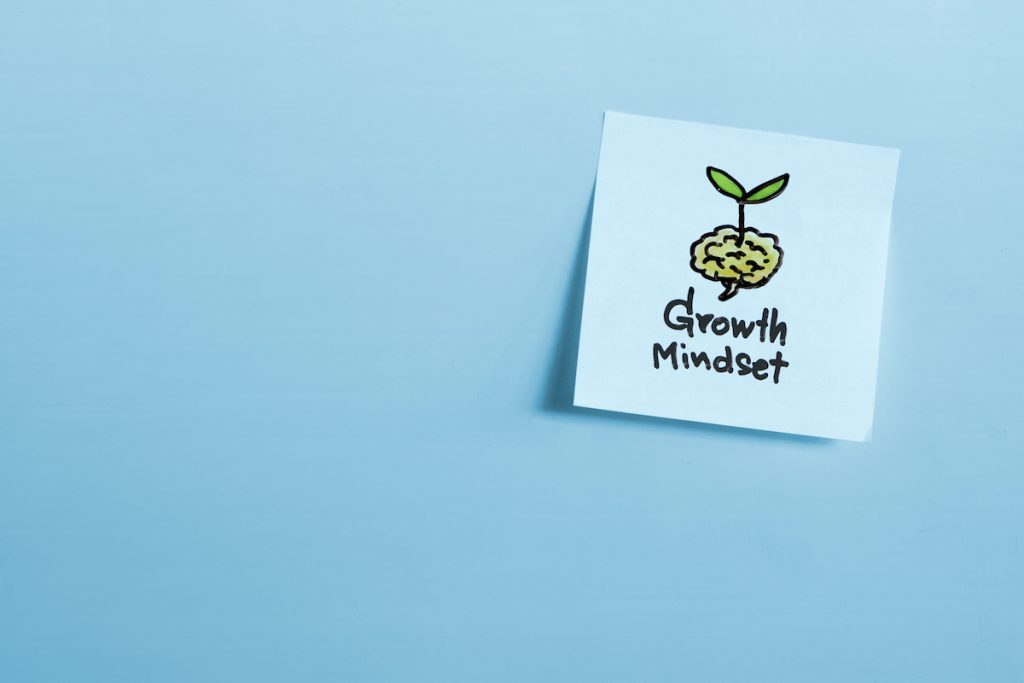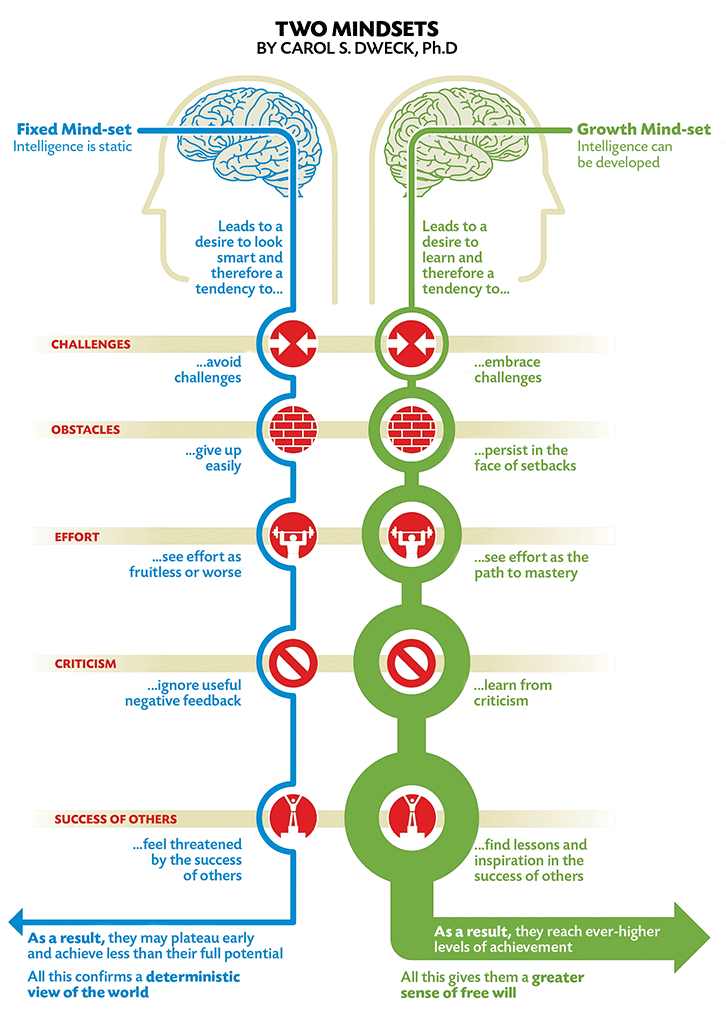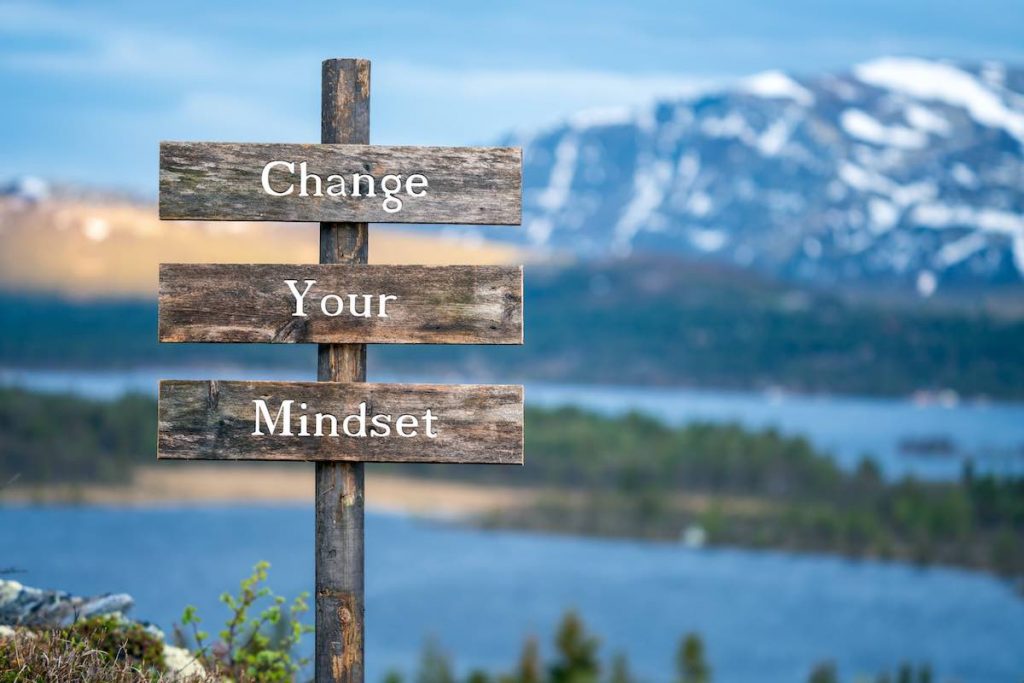You may have heard of the growth mindset before, but what does it actually mean to have a growth mindset? How is it different from a fixed mindset?
In this blog, I cover the differences between the two and how having a growth mindset can propel you in your sports career, at work, and with your relationships. We’ve all heard about the power of the mind, but it’s important to check in with ourselves every so often. Are we doing everything we can to fulfill our potential? Let’s take a deeper dive.
The Power of Mindset
So much of what we’re taught is dictated by the mindset and energy of the people around us. Imagine if we were all self-aware enough to recognize this and understand when the advice or feedback we’re being given is helping us or hindering our progress.
While there are day-to-day changes and some days it can feel a whole lot easier to find motivation and to have a hunger for growth, there is something so simple governing how we approach each new day, each new task, each new challenge. Our mindset.
Mindset by Carol Dweck
If you follow Nutrigility on Instagram, you should feel a common theme of growth, learning, and agility. So you can imagine I was pretty excited when I decided to sit down and write this post. I received the book Mindset: The New Psychology of Success by Carol Dweck from a soccer teammate when I graduated from college. A few weeks ago, I decided it was time to pick up the book again. Since I first read it, I went through grad school, became a dietitian, lived in bustling New York City, got into a wonderful relationship, worked many different jobs, and started my own business. I also moved to a completely new area that was different than any other place I had lived. Reading the book now, after many more life experiences, inspired me to share this life-changing information with you so you too, can benefit from it.
Carol Dweck covers endless examples of athletes, students, parents, coaches, teachers, and CEOs – some who found great success and others who eventually succumbed to the fixed mindset. Those examples alone are worth the read. Here I will share some of my own experiences and thoughts to provide another perspective on how important the growth mindset really is and strategies you can take to develop yours even further.
The Growth Mindset vs. Fixed Mindset
Let’s start with the basics. According to Dweck, there are two key mindsets that people fall into – the growth mindset, and the fixed mindset. Nigel Holmes created an awesome mindset diagram based on Carol Dweck’s work to show some of the key differences between the two. It is clear that there are stark differences between a growth and fixed mindset.
And while a lot of it has to do with our internal dialogue, a lot of it can start out being dictated by where we grow up, who we surround ourselves with, where we live, and where we work. We can have a growth mindset for some things and a fixed mindset for others. It’s something to work on over time. While some people may have more of a growth mindset starting point, that doesn’t mean that there aren’t times where the fixed mindset starts to crawl in. Now for a closer look at both.
What is the Growth Mindset?

I’m sure there are many different definitions of the growth mindset, but I define it as a way of thinking and living that doesn’t quantify ability or intelligence based on what we were born with. It is a mindset that cherishes learning and sees failure as an opportunity to grow. A lot of the growth mindset, especially in leadership, revolves around the idea of we and us, rather than I and me.
Great Growth Mindset Quotes:
“A person who never made a mistake never tried anything new.” – Albert Einstein
“Nothing is impossible – the word itself says I’m possible.” – Audrey Hepburn
“Be more concerned with your character than your reputation, because your character is what you really are, while your reputation is merely what others think you are.” – John Wooden
“Failure is so important. It is the ability to resist failure or use failure that often leads to greater success.” – J.K. Rowling
“Don’t worry about failure. Worry about the chances you miss when you don’t even try.” – Jack Canfield
Do you see a common pattern across these quotes? There’s a theme of effort, learning, and positivity.
What is a fixed mindset?
The fixed mindset is a way and a pattern of thinking revolving around the idea that we cannot improve our abilities or intelligence, and we are only born with certain talents and capabilities.
“You’re really smart.”
“You’re really good at sports.”
“You’re a born pro.”
Sound familiar?
What’s one of the biggest downfalls of this? People can get stuck in the belief that if they fail at something, or don’t produce the results that people expect, they just aren’t worthy or successful. So they either give up or make an excuse for why it didn’t work. There is little accountability in terms of work or effort that has to be put in.
Instead of growing from experiences and building upon past failures or successes, people with the fixed mindset often hold onto the comfortable rather than stepping into the uncomfortable. This is extremely limiting and can greatly impact themselves, as well as the people around them. Something as simple as parents with a fixed mindset speaking to their child in ways that elicit fixed mindset patterns can impact that child for years to come.
A common belief with the fixed mindset shared in Dweck’s book is that “Imperfections are shameful- especially if you’re talented.” You can see how easily someone looking for perfection or success can diminish their own goals under this mindset.
Mindsets in Sport
If you played sports when you were younger, or are currently in the midst of a competitive sport, some of these ideas likely resonate with you. As you get older and move up to more competitive play, it can be easy to make excuses or feel negative about your performance because other people are doing “better” or are getting more playing time. But some of the best athletes are the ones who put in the most work.
Fixed Mindset in Action
When I was growing up playing soccer I almost didn’t play club soccer because I was worried that I wouldn’t be good enough. I was already doing very well in the more local soccer area and I was scoring a lot, but what if I was bad and not what they expected when I got to the club team? These types of thoughts continued throughout high school and made me question whether or not I could play college soccer. After all of that worry, I ended up playing Division 1 soccer. A lot of what I was telling myself was coming from my own worries of failure and striving for perfection.
I’m sure many of you can relate to this thought pattern – whether in sports, relationships, or work. Failure can be paralyzing for many of us, and if not completely paralyzing, it can limit our potential. Curious to know how my sports journey impacted my career? I go into more detail in my article Former Division 1 Athlete to Dietitian.
The Growth Mindset at Work
How can we optimize our workdays and find success? We continue to remind ourselves that growth is a process. There are some things that we may start out not knowing or not understanding. I loved that Dweck says, “our brains are like a muscle”. We don’t expect our muscles to get stronger without lifting weights or exercising, so how would we expect to get better at something without putting in the effort and learning?
Unfortunately, work culture can make this more difficult at times. A good boss builds up the people around them and leads by example to highlight the power of working as a team. They can motivate you day in and day out, with the expectation that effort is more important than innate ability. It’s crazy to think that just one person can change the way we think about ourselves, and can dictate the culture at work.
Evaluate Your Mindset at Work
I challenge you to look at your typical workday or your work environment and evaluate how you talk to yourself. What does your self-talk sound like when you come across a challenging task? Is it more along the lines of 1 or 2?
- “This is difficult. Why was I given this, this isn’t in my line of work?”
- “This is different and challenging, but it’s an opportunity. It’s something new I get to learn and apply to my future work, even if it takes more time to understand right now.”
Can you guess which one is the growth mindset? If you guessed 2 then you’re correct.
The Growth Mindset for Leaders
Leading a company or a team with the objective to help people develop and garner potential makes a great leader. It’s a matter of using “we” and “us” rather than “me” and “I.” A good leader is self-aware and can focus on those elements with the people that they’re leading – leading with the idea of nurturing someone’s learning capability, helping them find new ways to learn to find success. We all have the potential to be great leaders, but it takes persistence and a whole lot of effort. Someone can be a leader, but that doesn’t mean that they have good character, or are leading people in the right direction.
10 Steps to Developing a Growth Mindset
Now that you’ve gotten a sense of how the mindsets can play out in different scenarios, here is a step-by-step process that can help you develop your growth mindset. I recommend coming back to this at least once every few months to make sure you’re checking in and staying on track.
- Accept, celebrate, and embrace any of your “flaws” and imperfections.
- Evaluate childhood influences.
- Evaluate your response to failure or challenge.
- Evaluate how you speak to others.
- Evaluate how you treat the people who look up to you.
- Stop relying on acceptance from others.
- Don’t take things personally.
- Have a plan of action.
- Be open to growth and feedback.
- Enjoy the process.
1. Accept, celebrate, and embrace any of your “flaws” and imperfections.
We often see things as imperfections by comparing ourselves to others, but every person is unique and is on their own path. If you feel the need to compare, assess where you are now to where you were a few years ago. You may have things you want to change and grow, but this is very different than getting stuck because of something you don’t “have.”
2. Evaluate childhood influences.
Look back on your childhood – what type of messaging did you receive about your successes and failures. Was it around your innate abilities or work effort? If it was the former, write out examples of what you were told. Then, next to them, write down how these could have been framed in more of a growth mindset way to target effort rather than ability.
3. Evaluate your response to failure or challenge.
Write down common phrases you say to yourself when you fail at something, or when a task is challenging. Write G next to ones that are from a growth mindset and F from ones that are from a fixed mindset. Rewrite the ones that are from a fixed mindset so that they leave room for growth.
4. Evaluate how you speak to others.
Next think about how you speak to your colleagues, friends, and family. Do you focus on their abilities (or lack thereof), or how hard they are working towards their goals and the progress they’re making? Remember, developing a growth mindset involves self-introspection, as well as the way you communicate.
5. Evaluate how you treat the people who look up to you.
This could include people you manage directly at work, people who work for you, athletes you coach, your children, or people who are younger than you. Are you focusing on their current success, or on their hard work and potential? Do you judge them if they don’t know something or don’t know how to do a task you asked them to complete?
6. Stop relying on acceptance from others.
If you know that you’re putting in your best effort, and someone tells you it isn’t good enough, you can still know that you gave it your all. In sports, we’re often told to give 120%. If you do that, you can’t look back and think “what if.”
7. Don’t take things personally.
We can probably all benefit from this reminder at least once a day. If someone says something to us that we don’t agree with, criticizes us, or provides feedback, it’s easy to go on the defense and question our ability. Instead, open your mind to criticism, and see the value in what’s being shared. You don’t have to agree with everything other people say or believe, but find the reason behind it and see if there’s a new way you can look at something. Then remind yourself that whatever is said isn’t personal – it’s usually a reflection of their own beliefs and their own mindset.
8. Have a plan of action.
Things seldomly get accomplished without a plan. Use a calendar, make a to-do list with dates, or come up with any other way that you know you can hold yourself accountable. I LOVE the self planner from BestSelf and highly recommend it for anyone looking to achieve goals with some inspiration and accountability.
9. Be open to growth and feedback.
This may seem straightforward, but it’s really at the core of the growth mindset. To be able to learn and improve at something, we have to be willing to do the work to get there. This includes the willingness to fail, the willingness to be uncomfortable, and the willingness to be vulnerable and admit defeat. What we do and accomplish after those moments is what matters most.
10. Enjoy the process!
Short and simple. Enjoy the process of life and spend it with people who have your best interest at heart. Time is too precious to waste it worrying about the things that can go wrong, people who tear us down, or what we aren’t accomplishing.
Starting Your New Journey of Growth
Here is the fantastic graphic by Nigel Holmes to summarize Carol Dweck’s work.

As you navigate through life, you’ll be able to spot growth-minded thinkers. Surround yourself with them, and pay attention to how you speak to yourself and others. We all have our own battles, and it’s what we do in the process, and continue to do over time, that really defines us!
Learning is invaluable, and the only way we’re going to continue to grow together is to share our experiences and to be open to new ideas. Whether you’re a high school or college athlete, a CEO, a solopreneur, a parent, a teacher, or are working for a large company (or any of the above!), never underestimate the power of teamwork and hard work. The growth mindset cannot live without them.


